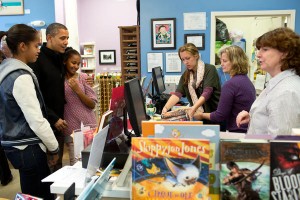A Republican in Exile–Why FOX News Doesn’t Book Bruce Bartlett Anymore
Bruce Bartlett is a longtime economic conservative who worked for Republican officeholders going back to the first Reagan administration. He even worked in the company of Jude Wanniski, basically the originator of supply-side economics. He was, as is said, “present at the creation”–in this case of modern conservatism.
Beginning soon after George W. Bush’s re-election it became apparent if you knew Bartlett from earlier in his career that he was increasingly uncomfortable with Republican orthodoxy. For Bartlett, it arose specifically over Bush policies, especially the reckless spending he committed the country to, as in the 2006 Medicare drug bill. Bartlett voiced his opposition prominently in conservative media, and as he tells it in an important chronicle published Tuesday in the American Conservative, it got him called on the carpet at think tanks he’d written for and worked at, and dismissed more than once over the past several years. The ire directed toward him by true believers made things more difficult for him financially.
One nugget that’s gotten play in the media today is Bartlett’s contention that when he published the book, Impostor: How George W. Bush Bankrupted America and Betrayed the Reagan Legacy (2006), bigwigs at FOX let it be known inside the network that he was not to be booked on any of their programs. Greg Sargent reported on this today in Plum Line. Sargent spoke with Bartlett’s then-publicist at Doubleday, Nicole Dewey, who explained that
“She . . . tried extensively to get him booked on FOX to discuss the book — to no avail. ‘It was surprising to me that no one would book him,’ Dewey told [Sargent]. ‘He had been a regular on Fox News prior to that. He had been interviewed on any number of Fox News shows before that.’ Once Bartlett published the book, Dewey confirms, ‘I was pitching him directly to probably most of the shows that were on Fox at that point. No one would book him.’ A Fox spokesperson didn’t immediately return an email for comment. Asked directly about Bartlett’s claim that she’d been told that ‘orders had come down from on high’ that the book was to receive ‘no publicity whatsoever,’ Dewey said she didn’t remember precisely what reason she was given by Fox for not booking Bartlett for any appearances—it was six years ago. But she said Bartlett’s description of events ‘rings true to me. My general sense was that they didn’t like the message of the book,’ Dewey said. ‘Bruce’s recollection of events sounds exactly like what happened.’”
In the hours since Sargent posted his interview with Nicole Dewey, there’s been a little pushback from FOX and the Wall St. Journal (updates that Sargent has appended to his blog post) where Bartlett thought he had also been shut out. However, an editor there, Gerald Seib, denied this after seeing Bartlett’s article. Bartlett concedes in an update to his piece that he may have been wrong about the Journal, but contends his main point about FOX remains true.*
I love that Sargent sought out the publicist, Dewey (who now works at Little, Brown), and am glad for my industry that one of our professionals had first-hand knowledge and was available to be consulted about a matter where current events and publishing coincide so intimately in an important news item.
The title of Bartlett’s article “Revenge of the Reality-Based Community–My life on the Republican right—and how I saw it all go wrong“, is a nod to Ron Suskind’s pivotal 2004 NY Times Magazine story, “Faith, Certainty, and the Presidency of George W. Bush.” Bartlett was quoted in Suskind’s story, after which he was “chewed out” by his boss. As important as Suskind’s article became in understanding the Bush administration’s divorce from reality, I think Bartlett’s will be judged equally important in understanding how life for many longtime Republicans has become untenable for them within their own party. Bartlett’s is piece is also a helluva read, kind of suspenseful and dramatic, with a lot of the author’s own self in it. I think this piece should be in all the round-ups of longform stories this week–even for the year 2012–whether longreads.com, longform.org, or the Daily Beast’s weekly round-up of imperative reads in narrative journalism. In fact, I think I’ll share this post with Lucas Wittmann, Books Editor at the Beast, and recommend Bartlett’s piece to him.
Disclosure: I am a Facebook friend of Bruce Bartlett (he’s got about 3,500 friends). We’ve never met or spoken.
*Update: David Frum, also the target of right-wing ostracism, vouches for publicist Nicole Dewey in a brief Daily Beast piece:
“I know Nicole Dewey, the source quoted by Greg Sargent in the piece linked, and she is indeed one of the best of the best in the business.”









